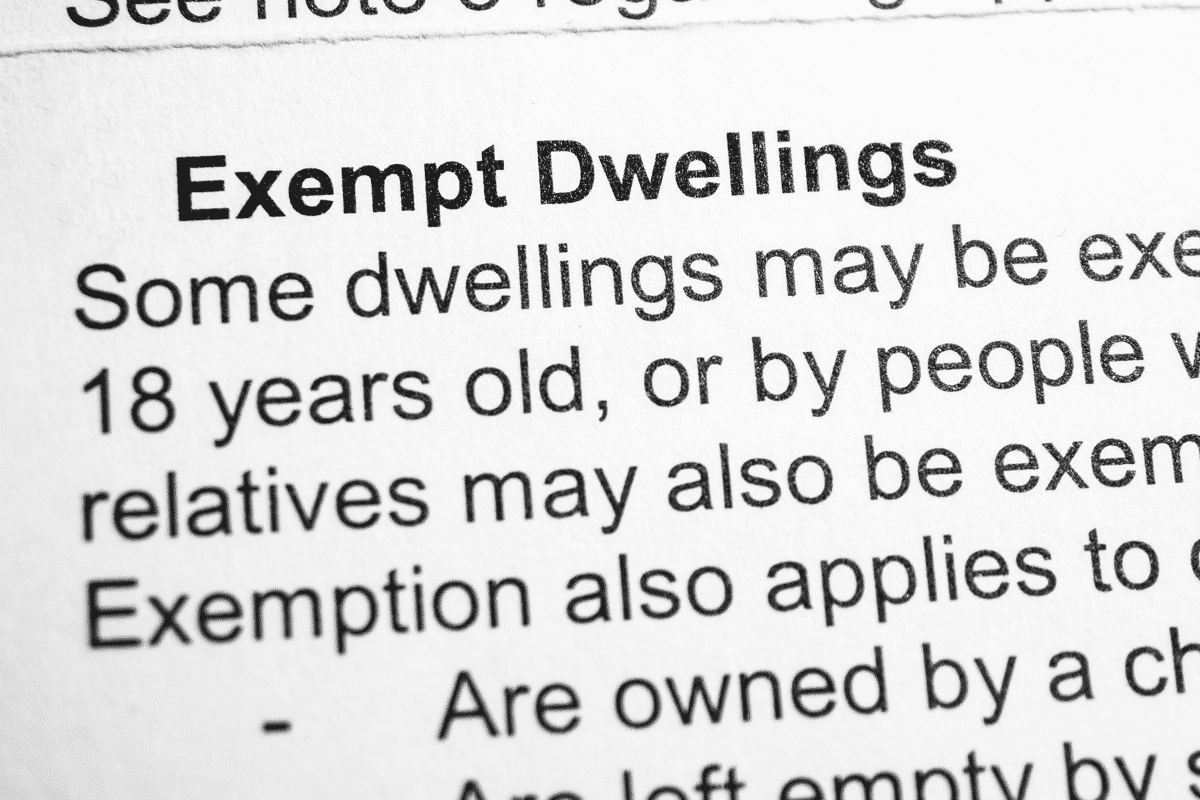When Can You Claim a Council Tax Exemption? or Get a Discount
Council tax is expensive wherever you live in the country, there is no denying it.
Of course, if you own a home or an investment property in London, your council tax bill will be more expensive than if you are buying a property in Leeds.
However, on occasion, there are times when you can challenge your council tax bill to try and lower the banding so you can reduce the cost. Or get a council tax exemption so that you have zero council tax to pay, even if for a short period of time.
So, although you have to pay Council Tax for any property you live in, whether you own it or rent it, below we cover some ways in which you could claim a legitimate Council Tax exemption or discount.
Article updated: October 2025
Contents

-
by Robert Jones, Founder of Property Investments UK
With two decades in UK property, Rob has been investing in buy-to-let since 2005, and uses property data to develop tools for property market analysis.
What is Council Tax?
Council Tax is a tax levied by local government to fund the provision of local services including education, social care, refuse collection and roads amongst other things.
Every residential property is put into a Council Tax valuation band based broadly on its value. The eight Council Tax bands run from A for the cheapest property to H for the most expensive. Wales has nine bands from A-I.
Council Tax applies across the country. The annual amount payable for a property in each band is decided by local councils, however.
Local councils also have discretion as to what Council Tax exemptions or discounts to give so they are not exactly the same in all areas.

Who Can Get a Full Council Tax Exemption?
The UK government provides exemptions for a range of people and it is specific to the residents circumstances as well as the property. There are some exemptions which are set by central government and there are some discounts which are chosen by local councils.
If you are looking for a council tax exemption the first step is knowing which council you are under and then you can check their local website for any updates. You can check which council you are under here.
A full council tax exemption means you pay nothing - your council tax bill is reduced to zero. These exemptions typically apply to specific property situations rather than personal circumstances, though there are some exceptions.
Empty Properties
If your property is empty and unfurnished, you may qualify for a council tax exemption, though the rules vary significantly between councils and circumstances.
Most councils provide a short exemption period of one to three months when a property first becomes empty and unfurnished. This gives you time to find new tenants if you're buying an investment property or to move in if you've just purchased a home. However, some councils have removed this discount entirely, so check with your local authority.
Properties can also be exempt from council tax in these specific empty property situations:
Repossessed Properties: If a mortgage lender has repossessed your property, the owner is exempt from council tax. As part of the exemption process you will need to provide a copy of the repossession order. So if you are considering buying a repossessed house there many be no further exemption on it and council tax is likely payable from the day you purchase.
Compulsory Purchase: Properties that have been compulsorily purchased by a local authority or other organization are exempt from council tax. This exemption continues until the property is either occupied or demolished.
If you have a long-term empty property, you may be able to access grants to help bring it back into use. We've compiled guides for:
- Empty home grants in London
- Empty home grants in the East Midlands
- Empty home grants in the West Midlands
- Empty home grants in the North West
Full-Time Students
If everyone who lives in a property is a full-time student, the property is completely exempt from council tax. This is one of the most commonly claimed exemptions. If you're interested in how to become a student landlord, understanding this exemption can help reduce your costs.
To qualify as a full-time student for council tax purposes, your course must last at least one year and involve at least 21 hours of study per week. This typically includes undergraduate and postgraduate university courses.
Properties occupied by students under the age of 20 on courses that last more than three months and involve more than 12 hours of study per week are also exempt, even if the course is not a higher education qualification.
Important: If even one person in the property is not a student, the exemption does not apply. However, students are "disregarded" when calculating council tax, which means the remaining occupants may qualify for a single person discount or other reduction.
Uninhabitable Properties
If your property cannot legally be lived in, or is in such poor condition that it's uninhabitable, you may be exempt from council tax (or some councils provide a 25% discount).
Derelict Properties: Properties that are derelict or structurally unsound enough that they cannot be occupied are exempt or applicable for a council tax discount. The property must be genuinely uninhabitable - not just in need of decoration or minor repairs. If you're wondering can you sell a house with structural damage, the answer is yes, and the council tax exemption may help offset holding costs while you find a buyer.
Properties Undergoing Major Works: If your property is undergoing substantial structural repairs or major renovation work that makes it uninhabitable, it may be exempt from council tax. This exemption typically applies when the work is so extensive that no one can reasonably live in the property during the works.
Care Home Residents
If you've moved into a care home or hospital on a long-term basis, your former home may be exempt from council tax.
This exemption applies when someone who previously lived in the property has moved into residential care, a hospital, or a hostel providing a high level of care. The property must be unoccupied, and the person must intend to return eventually, even if this is unlikely in practice.
Properties After Death (Probate)
When someone dies, their property may be exempt from council tax for up to six months after probate is granted. This gives executors time to sell the house under probate or arrange for new occupants without incurring council tax charges.
The exemption applies from the date of death until six months after probate is granted. If probate takes a long time to obtain, the exemption period can extend significantly.
This exemption only applies if the property remains unoccupied. If someone moves into the property during this period, council tax becomes payable as normal.
Other Exemptions
Several other, less common situations also qualify for full council tax exemption:
Prisoners: Properties normally occupied by someone who is in prison are exempt from council tax, except where the person has been imprisoned for non-payment of council tax or fines.
Diplomatic Properties: Properties occupied by diplomats, members of visiting forces, or staff of certain international organizations may be exempt. At least one person who would normally be liable for council tax must have diplomatic immunity or equivalent status.
Annexes: Self-contained annexes that are occupied by a dependent relative (such as an elderly parent or adult child with disabilities) may qualify for exemption in some circumstances.

Council Tax Discounts
If you don't qualify for a full exemption, you may still be entitled to a council tax discount. These reductions can save you 25% to 50% on your council tax bill.
Single Person Discount (25%)
If you live alone, you're entitled to a 25% discount on your council tax bill. This is one of the most common discounts and applies automatically once you inform your council.
The single person discount applies whether you own your home or rent it. You simply need to be the only adult living in the property to qualify.
Who Counts as an Adult? For council tax purposes, only people aged 18 and over count as adults. Children under 18 don't affect your eligibility for the single person discount.
Who is Disregarded? Some adults don't count when working out how many people live in a property. If you live with someone who is "disregarded," you can still claim the single person discount. People who are disregarded for council tax include:
- Full-time students, student nurses, and apprentices
- 18 and 19-year-olds in full-time education
- People who are severely mentally impaired
- Live-in carers who look after someone who isn't their partner, spouse, or child under 18
- Members of religious communities such as monks and nuns
- People with diplomatic immunity
- Foreign language assistants registered with the British Council
If everyone in your property is disregarded, you may qualify for a full exemption rather than just a discount.
Disabled Band Reduction
If you or someone you live with is disabled, you may qualify for a reduction that moves your property down one council tax band. This is called the Disabled Band Reduction Scheme.
You may be eligible for the scheme if you live in a larger property than you would need if you or another occupant were not disabled. If your home is already in the lowest band A you will receive a 17% discount.
The disabled person must be a resident of the property, and the property must be their main or only home. If you qualify, your property is charged at the band below its actual rating. For example, if your home is in Band D, you'd pay Band C rates.
Second Homes and Holiday Lets
The rules around council tax for second homes and holiday properties have changed significantly in recent years, most councils no longer offer discounts and indeed they now charge a premium.
Second Homes: Most local councils have removed discounts for second homes entirely. Some councils now charge a premium of up to 100% extra council tax on second homes that remain empty for long periods. This means you could pay double the standard council tax rate.
Holiday Lets: If you run a holiday let as a business and rent it out for short-term holiday accommodation, you may be able to avoid council tax entirely by paying business rates instead. This can be advantageous as some small businesses qualify for business rates relief.
To qualify for business rates rather than council tax, your property must be available for letting as self-catering accommodation for at least 140 days per year and actually let for at least 70 days per year. You can read more about council tax and business rates for holiday lets here. If you're considering buying a holiday let, understanding these requirements is essential for planning your costs.
The distinction between a holiday let and a standard buy-to-let property is important. While a let agreed property typically involves a long-term tenancy agreement, holiday lets operate on short-term bookings with different tax and council tax implications.

Council Tax Support (Up to 100% Off)
Council Tax Support is a means-tested benefit that can reduce your council tax bill based on your financial circumstances. Unlike exemptions and discounts which apply to specific situations, Council Tax Support is available to anyone on a low income or claiming certain benefits.
This support replaced Council Tax Benefit in 2013 and is sometimes called Council Tax Reduction. The amount of support you receive depends on your income, savings, household circumstances, and which council area you live in.
Who Qualifies for Council Tax Support?
You may be able to claim Council Tax Support if you're on a low income or claim benefits, whether you rent or own your home. Both working people and those receiving benefits can apply.
You're more likely to qualify if you:
- Receive income-related benefits such as Income Support, Jobseeker's Allowance, or Employment and Support Allowance
- Receive Pension Credit (Guarantee Credit)
- Receive Universal Credit
- Are on a low income, even if you're working
Each council runs its own Council Tax Support scheme, so eligibility criteria and the amount of support available can vary depending on where you live. Most councils offer more generous support to pensioners than to working-age claimants.
How Much Support Can You Get?
The amount of Council Tax Support you receive depends on several factors including your income, savings, who lives with you, and your council's local scheme.
In the best cases, Council Tax Support can reduce your bill to zero, meaning you pay no council tax at all. This is most common for pensioners on Pension Credit or working-age claimants with very low incomes and no savings.
You can claim Council Tax Support alongside other exemptions and discounts. For example, if you qualify for the single person discount and Council Tax Support, you'll receive both.
To apply for Council Tax Support, contact your local council. You can find your local council using the government's council finder tool. Most councils allow you to apply online, by phone, or by completing a paper form.
How to Claim a Council Tax Exemption
You can claim a Council Tax exemption or reduction by contacting the Council Tax department of the local council where your property is located.
You can usually claim a Council Tax reduction or exemption by phone, online or by filling in a paper form, depending on the council and the kind of exemption you are claiming. You may need to provide evidence to support your claim.
Councils must make a decision on your claim for Council Tax exemption or discount within two months. If you disagree with their decision, you can appeal through the Valuation Tribunal Service.
It is advisable to double-check that you are eligible before claiming your Council Tax exemption. Be aware that local councils have discretionary powers to vary the circumstances under which they give Council Tax exemptions. Council Tax exemptions that are available in one council area may not be available in another.
There are also differences to Council Tax exemptions in Scotland.
Northern Ireland has Domestic Rates instead of Council Tax. There are a number of ways in which discounts or exemptions can be given from rates including rates rebates in Northern Ireland.
Frequently Asked Questions
How long does council tax exemption last?
The length of a council tax exemption depends on the type of exemption you're claiming. Different councils apply varying time limits, but here are the typical durations:
- Student exemptions: Last for the duration of your course, provided everyone in the property remains a full-time student
- Empty property exemptions: Typically last for one to three months, though this varies by council
- Properties under probate: Exempt for up to six months after probate is granted
- Properties undergoing major structural work: Usually exempt for up to 12 months while the work takes place
- Care home residents: Exemption continues as long as the property remains unoccupied and the person remains in care
Can you apply for council tax exemption before moving in?
Yes, you can apply for council tax exemption before moving into a property, but only if the property qualifies for exemption based on its current status rather than your personal circumstances.
For example, if you're buying a property that's currently empty and unfurnished, you can claim the empty property exemption from the date you become liable for council tax (usually completion date). Similarly, if you're buying a property that requires major structural work before you can move in, you can claim exemption for uninhabitable properties.
However, you cannot claim exemptions based on your personal status (such as student exemption) until you actually move in and the property becomes your residence. Contact your local council as soon as you become responsible for the property to ensure you claim any applicable exemptions from day one.
What makes a house uninhabitable for council tax?
A property is considered uninhabitable for council tax purposes when it cannot reasonably be lived in due to its physical condition or legal restrictions. What is meant by uninhabitable varies by council, but the property must be genuinely unfit for occupation, not just uncomfortable or in need of cosmetic improvements.
Properties qualify as uninhabitable when they lack essential facilities such as a functioning kitchen, bathroom, or heating system, have serious structural problems that make them unsafe, suffer from severe damp, mould, or water damage that poses health risks, or have been condemned or prohibited from occupation by the local authority.
Simply being empty, outdated, or requiring decoration is not enough to qualify as uninhabitable. The council may inspect the property to verify its condition, and you'll need to provide evidence such as surveyor reports, photos of the damage, or notices from building control. If your property is genuinely derelict, you may be able to remove the property from the council tax list entirely. If you're unsure whether your property qualifies, contact your local council's empty homes team for guidance.
Is council tax compulsory?
Yes, council tax is compulsory for anyone who owns or rents a residential property in England, Scotland, or Wales, unless they qualify for a full exemption. You cannot simply choose not to pay council tax.
However, many people qualify for exemptions, discounts, or Council Tax Support that can reduce their bill significantly or to zero. If you're struggling to pay council tax, you should apply for Council Tax Support or contact your council to discuss payment arrangements rather than simply not paying.
Can I get council tax exemption if I'm renovating?
You may be able to get council tax exemption while renovating a property, but only if the renovation work is substantial enough to make the property uninhabitable. Understanding evidence requirements for property conversions classed as major renovations is essential for a successful claim.
Minor improvements like redecorating, replacing a kitchen, or updating a bathroom don't qualify for exemption. However, major structural work such as rebuilding walls, replacing the roof, installing new plumbing or electrical systems throughout, or work that requires the property to be completely empty for safety reasons may qualify.
The key test is whether anyone could reasonably live in the property during the works. If the property has no working kitchen, bathroom, or heating, or if it's unsafe to occupy, you may qualify for exemption. Most councils limit this exemption to 12 months, and you'll need to provide evidence of the ongoing work such as building control approvals, contractor invoices, or photos showing the extent of the renovation.
Each council has its own criteria for renovation exemptions, so contact your local authority before starting work to understand whether you'll qualify and what evidence you'll need to provide.
